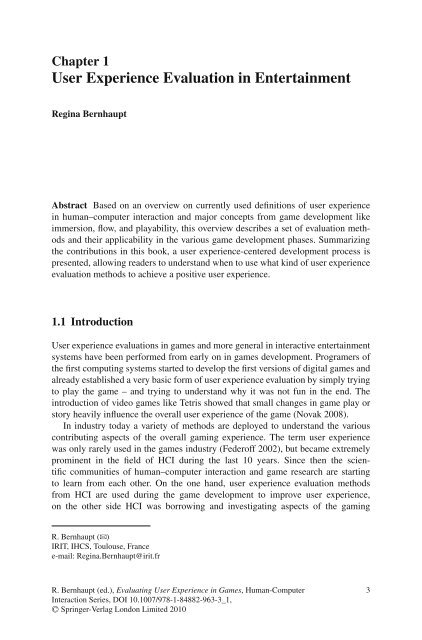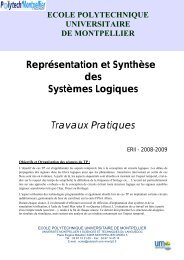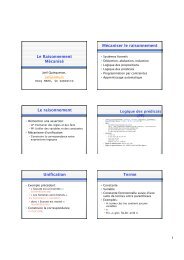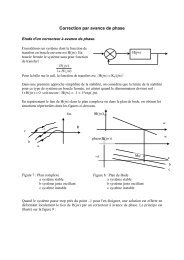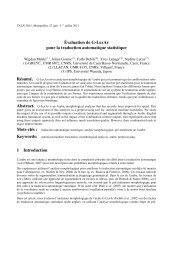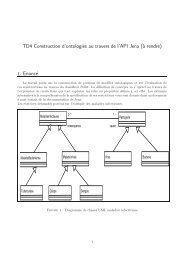Evaluating User Experience in Games: Concepts and Methods - Lirmm
Evaluating User Experience in Games: Concepts and Methods - Lirmm
Evaluating User Experience in Games: Concepts and Methods - Lirmm
You also want an ePaper? Increase the reach of your titles
YUMPU automatically turns print PDFs into web optimized ePapers that Google loves.
Chapter 1<br />
<strong>User</strong> <strong>Experience</strong> Evaluation <strong>in</strong> Enterta<strong>in</strong>ment<br />
Reg<strong>in</strong>a Bernhaupt<br />
Abstract Based on an overview on currently used def<strong>in</strong>itions of user experience<br />
<strong>in</strong> human–computer <strong>in</strong>teraction <strong>and</strong> major concepts from game development like<br />
immersion, flow, <strong>and</strong> playability, this overview describes a set of evaluation methods<br />
<strong>and</strong> their applicability <strong>in</strong> the various game development phases. Summariz<strong>in</strong>g<br />
the contributions <strong>in</strong> this book, a user experience-centered development process is<br />
presented, allow<strong>in</strong>g readers to underst<strong>and</strong> when to use what k<strong>in</strong>d of user experience<br />
evaluation methods to achieve a positive user experience.<br />
1.1 Introduction<br />
<strong>User</strong> experience evaluations <strong>in</strong> games <strong>and</strong> more general <strong>in</strong> <strong>in</strong>teractive enterta<strong>in</strong>ment<br />
systems have been performed from early on <strong>in</strong> games development. Programers of<br />
the first comput<strong>in</strong>g systems started to develop the first versions of digital games <strong>and</strong><br />
already established a very basic form of user experience evaluation by simply try<strong>in</strong>g<br />
to play the game – <strong>and</strong> try<strong>in</strong>g to underst<strong>and</strong> why it was not fun <strong>in</strong> the end. The<br />
<strong>in</strong>troduction of video games like Tetris showed that small changes <strong>in</strong> game play or<br />
story heavily <strong>in</strong>fluence the overall user experience of the game (Novak 2008).<br />
In <strong>in</strong>dustry today a variety of methods are deployed to underst<strong>and</strong> the various<br />
contribut<strong>in</strong>g aspects of the overall gam<strong>in</strong>g experience. The term user experience<br />
was only rarely used <strong>in</strong> the games <strong>in</strong>dustry (Federoff 2002), but became extremely<br />
prom<strong>in</strong>ent <strong>in</strong> the field of HCI dur<strong>in</strong>g the last 10 years. S<strong>in</strong>ce then the scientific<br />
communities of human–computer <strong>in</strong>teraction <strong>and</strong> game research are start<strong>in</strong>g<br />
to learn from each other. On the one h<strong>and</strong>, user experience evaluation methods<br />
from HCI are used dur<strong>in</strong>g the game development to improve user experience,<br />
on the other side HCI was borrow<strong>in</strong>g <strong>and</strong> <strong>in</strong>vestigat<strong>in</strong>g aspects of the gam<strong>in</strong>g<br />
R. Bernhaupt (B)<br />
IRIT, IHCS, Toulouse, France<br />
e-mail: Reg<strong>in</strong>a.Bernhaupt@irit.fr<br />
R. Bernhaupt (ed.), <strong>Evaluat<strong>in</strong>g</strong> <strong>User</strong> <strong>Experience</strong> <strong>in</strong> <strong>Games</strong>, Human-Computer<br />
Interaction Series, DOI 10.1007/978-1-84882-963-3_1,<br />
C○ Spr<strong>in</strong>ger-Verlag London Limited 2010<br />
3


